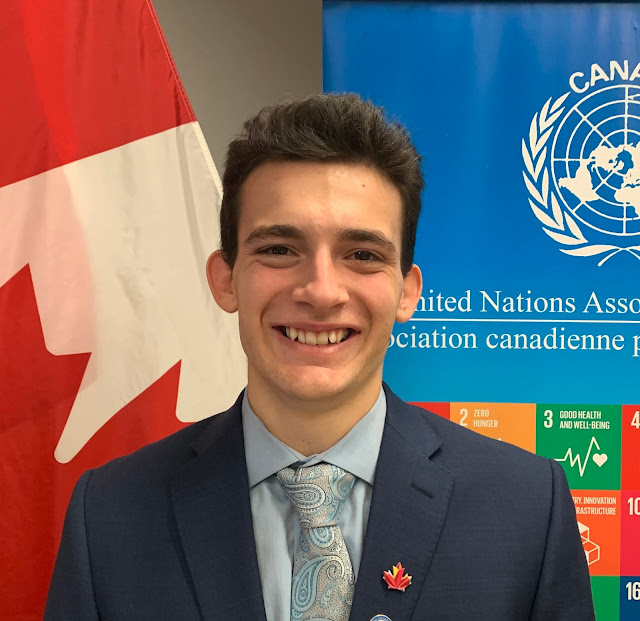Under the auspices of greatness: the 11th Geneva Forum at the UN headquarters
Under the auspices of greatness: the 11th Geneva Forum at the UN headquarters
Written by James Mager
Awestruck: the word
to best describe my experience at the United Nations headquarters in Geneva,
Switzerland. Alongside my Canadian Service Corps peers, Fallon Hayes and Kelsey
Kliparchuk, and lead by our intrepid guide, Jessica Helwig, I had the privilege
of representing the UNA-Canada at the 11th Geneva Forum. It was a
journey of personal and professional development, and a crash-coarse in
international relations that will retain its importance indefinitely.
The experience began with a week of training in Canada’s capital city, Ottawa. We were welcomed by the gracious staff of the UNAC and provided with the “dos and don'ts” for success. Working in the shadow of the Parliament was a treat for a nongovernment worker (and tourist) like myself. Between safety briefings, parliamentary tours and a meeting with Ambassador Salome Meyer, the Swiss ambassador to Canada, the pace was nonstop and challenging. In a few short days, the UNAC endowed us with the essentials and sent us packing; next stop, Switzerland.
The experience began with a week of training in Canada’s capital city, Ottawa. We were welcomed by the gracious staff of the UNAC and provided with the “dos and don'ts” for success. Working in the shadow of the Parliament was a treat for a nongovernment worker (and tourist) like myself. Between safety briefings, parliamentary tours and a meeting with Ambassador Salome Meyer, the Swiss ambassador to Canada, the pace was nonstop and challenging. In a few short days, the UNAC endowed us with the essentials and sent us packing; next stop, Switzerland.
Geneva can be a
puzzling place; geographically sandwiched between France and Italy, we were
told (by the locals) that it differs greatly from the rest of Switzerland. It
is posh, modern and glitzy, but has maintained an old world feel. Small pockets
of counterculture still exist—in neighbourhoods like Les Grottes and Carouge—but
its elite qualities are visible from all angles. Walking through the city you
will pass: the Rolex headquarters, fancy cars and restaurants, and a bevy of
incredibly well-dressed people. It is not a city for the faint of heart (or
wallet).
But the more immediate and impressive aspect is Geneva’s role as the intersection of global trade and diplomacy. The International Labour Organization (ILO), International Committee of the Red Cross (ICRC), World Health Organization (WHO) and more, are all situated there. The city resembles a global town square with dignitaries, government actors, nongovernment workers and activists all converging upon one another. And the pinnacle of this hub is, of course, the UN headquarters.
The Palais des Nations is an impressive compound. Imposing stone columns
and fortified entryways make one feel incredibly small—yet empowered—while
traversing the grounds. Inside, the vast hallways are decorated with art
donated by various member states, and at any point a multitude of languages
will be spoken within earshot. It’s frenetic, it’s grandiose, it’s glorious.
The 11th Geneva
Forum was divided into four topics, of which the “Rights of Nature” was my area
of focus. Leading the conference was lawyer-linguist Colin Robertson, a
soft-spoken polyglot who had previously worked for The Council to the European
Union. Working with lawyers, activists, and academics from the Netherlands,
Sweden, and Brazil (respectively), the day was spent debating the merits and
roadblocks to developing environmental protection under the “Rights of Nature”
framework. In brief, this concept aims to recognize nature’s “right to exist, persist, maintain and regenerate its vital
cycles.” It is a simple notion that must be considered locally and
globally if we are serious about environmental conservation.
The highlight of the forum—however wonky it may seem—was the opportunity to collaborate on a draft resolution with the experts in attendance. Using language outlined by the Rights of Mother Earth organization, the document calls upon the UN to adopt a Universal Declaration on the Rights of Mother Earth (UDRME) in a similar vein to the precedent set by the Universal Declaration of Human Rights (UDHR). Combining the many coauthors’ global perspectives was integral to formulating a precise and inclusive document. I would like to believe that the forward-thinking member states who drafted the UDHR—those that possessed clarity of vision on the objective necessities of human flourishing—would likely see our document as a crucial next step towards a more equitable and eco-conscious world.
The highlight of the forum—however wonky it may seem—was the opportunity to collaborate on a draft resolution with the experts in attendance. Using language outlined by the Rights of Mother Earth organization, the document calls upon the UN to adopt a Universal Declaration on the Rights of Mother Earth (UDRME) in a similar vein to the precedent set by the Universal Declaration of Human Rights (UDHR). Combining the many coauthors’ global perspectives was integral to formulating a precise and inclusive document. I would like to believe that the forward-thinking member states who drafted the UDHR—those that possessed clarity of vision on the objective necessities of human flourishing—would likely see our document as a crucial next step towards a more equitable and eco-conscious world.
I cannot express
enough gratitude to my co-delegates and leader. We slogged luggage and powered
through major jet-lag with unwavering smiles upon our faces. Kelsey, Fallon and
Jessica were supportive throughout, and shared tremendous expertise and
prowess. Thank you for being such great teachers and good company.
Thank you as well to the UNA-C, the Canadian Service Corps, and all of the people who dedicated their time and energy to this experience. It surpassed any expectations I may have had, and its impression on my development will have lasting effects—only for the better!






Comments
Post a Comment